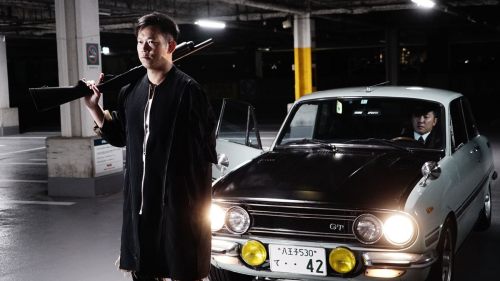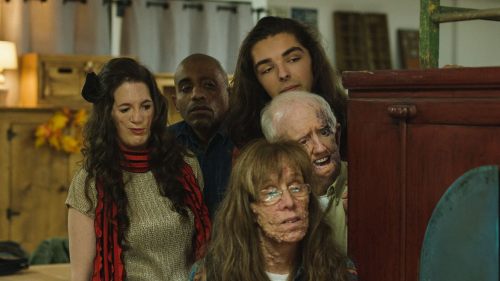Fantastic Fest Review: FIRST LOVE Offers A Cause Worth Fighting For
By himself, Takashi Miike has probably made more movies about gang violence than most moviegoers will ever see. Because those films are so wildly different, it feels like he’s explored the genre almost comprehensively, bouncing between unflinching depictions of violence, cartoonish spectacle, and sober reflection, with countless shades of grey in between. By comparison, First Love is a markedly straightforward affair, leavening its acts of brutality with a soupcon of gallows humor and an undercurrent of innocent romance. But thanks to the filmmaker’s talent and especially his endless gift for finding new ways to explore territory he’s already mastered, his latest gangland affair is less a return to the same well he’s drawn from in the past than a broader meditation on why people fight at all, be it for money, honor or love.
The film stars Masataka Kubota as Leo, a young boxer with the skill but not the passion to become a champion. He scrapes by on a combination of bout winnings and wages from a local eatery where he’s a server and dishwasher - that is, until a lost fight lands him in the hospital, where he learns that a malignant tumor has wrapped itself around his brain stem, forcing him into premature retirement. At the same time, a hungry Japanese gangster named Kase (Shota Sometani) conspires with a corrupt cop named Otomo (Nao Omori) to steal from his druglord bosses, requiring the two of them to rob one of Kase’s colleagues and his tough-as-nails girlfriend Juri (Becky).
While trying to pin the heist on Juri’s tenant Monica (Sakurako Konishi), a young drug-addicted woman sold into prostitution, Otomo collides - almost literally - with Leo, who thinks he’s rescuing the poor girl from an assailant. Little does Leo know that his act of heroism throws the thieves’ plan into disarray, and puts him and Monica in the crosshairs not only of Kase and Otomo, but Kase’s boss, the actual police, and a Chinese gang whose members find themselves being blamed for a robbery they had nothing to do with. Soon, Leo and Monica are on the run for a heist they know nothing about, while the various players in these competing organizations battle one another in increasingly violent ways not only to recover the stolen drugs but for control of a criminal landscape which is already fraught with simmering rivalries and unfulfilled vendettas.
The way that these characters’ paths intersect may involve some three-dimensional chess by screenwriter Masaru Nakamura, but Miike makes it all feel natural and look effortless, whether the escalation comes from complicating best laid plans, introducing new players, or simply acknowledging that there’s always a loose end dangling somewhere. But to one extent or another, these are all characters reckoning with legacies, whether they’ve built, inherited or are simply in the process of discovering them. As a boxer, Leo does what he’s been trained to do, but the absence of his parents has left him with more of a sense of obligation to that skill set than a passion to pursue glory with it. Kase hopes to escape the lifers’ mentality of being a yakuza member with a heist betraying his brethren, and bosses. And Monica is literally haunted by the spectre of her father, who sold her into prostitution to settle his debts before disappearing to let her succumb to a life of drug and sexual abuse.
The way these individual stories develop feels like vintage Miike - wickedly funny, and often brutally violent. But even if he indulges in some impish fun watching Kase’s heist blueprint repeatedly blow up in his face, the filmmaker injects a sense of melancholy and resignation to the way they resolve themselves. A showdown between a yakuza boss and the Chinese gangster he left with one arm is underscored by a mournful violin, and the two men hack at each other with an exhausting cruelty. And even when they are regarding the escalating danger with comical incredulity, both Leo and Monica are distressingly swept along in a violent current that reiterates and reminds each of them about the fates to which they believe they’re resigned. But what really distinguishes the film is the thematic resonance of simply choosing to fight at all - dedicating oneself to a cause, greedy or noble, and the myriad ways that this choice plays out.
All of which is why the premise of the film will undoubtedly feel familiar, but Miike continues to prove he’s capable of discovering the grace notes that distinguish this story from his previous work. First Love is a crime thriller from a master of the genre who could easily rest on his past accomplishments, but doesn’t; like his characters, he’s continued to make the choice to do something creative with work he already knows well - to care - which is precisely why audiences will share a similar investment as they watch it unfold.



